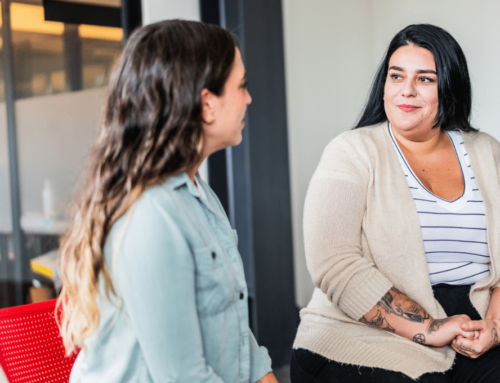This year’s National Developmental Disabilities Awareness Month theme is “A World of Opportunities” — a time to celebrate people and work together to remove obstacles. Oaks provides a full continuum of individualized services (in-home, residential and day programs) for children and adults living with a developmental disability in an encouraging, supportive environment.
Our goal is to offer support through each stage of life to allow individuals to reach their full potential and improve quality of life for the entire family. One of the most challenging periods can be the transition from child to adult services. When a child turns 21 in New Jersey and ages out of the children’s system of care, Oaks will walk hand and hand with the family to navigate through the transition process.
We asked Sheenah Pegeron, Oaks Assistant Vice President of Adult DD Services, to walk us through the process, key challenges and available support.
The Transition Process
This usually means that children transition from education in a school setting to adult services, which allows them to select from a multitude of services and supports. At the age of 21, they apply for Medicaid benefits and are placed on either the Community Care Program (CCP) or Supports Program (SP) Waiver, depending on their level of need. Once Medicaid eligible, new individuals on either waiver are given the opportunity to select a Support Coordination Agency to assist them in selecting their supports, which ultimately become part of their Individualized Support Plan.
Housing Opportunities
Additionally, these new adults become eligible for housing through the Supportive Housing Connection or other New Jersey/federal housing voucher programs like Section 8. Since this process can take anywhere from 1-3+ months, individuals and their families are encouraged to apply for these Medicaid services as they approach their 21st birthday and begin the process of researching Support Coordination Agencies and Service Provider Agencies as soon as possible.
Key Challenges
It is critical to note that, individuals living with a developmental disability transitioning from adolescence to adulthood experience many different challenges as this is a very important time in their lives. The largest challenge is the stark difference in the type of supports available to them in the children system of care and the adult care system.
Most individuals placed on the CCP waiver seek housing and are challenged with decisions associated with living in a new setting, with roommates, and support staff from an agency they are unfamiliar with. Also, selecting the type of support setting is difficult for families, as there are different options that offer various levels of supervision. For example, a group home typically provides 24-7 staffing support compared to a supervised or supportive apartment that may offer less support throughout the day.
Support and Resources
During this transition, families, and support networks can best assist individuals by providing resources and linkage to reputable supports in the New Jersey adult system of IDD supports. Also, helping them understand that transitioning from an adolescent to an adult is difficult for everyone, whether diagnosed with a disability or not, so it is important to stay patient.
Additionally, individuals in this transition period may need support determining what level of support they need versus what skills they already have developed. Helping them understand that moving out of their parents’ home may be a daunting task but that provider agencies are prepared to help them work toward their independence. For example, many individuals find out that getting hired for a job is a possibility now that the Supported Employment service is available to them through their new waiver program.
Providing individuals living with a development disability with resources upfront can help them make important decisions about where they want to live and what activities they want to engage in.
Help is Available
Our professional, caring staff utilize Trauma Informed Care and value strong connections with family, peers, school systems and community organizations. If you are in need of support for your loved one, call our Access Center at 1-800-963-3377 to learn more.









